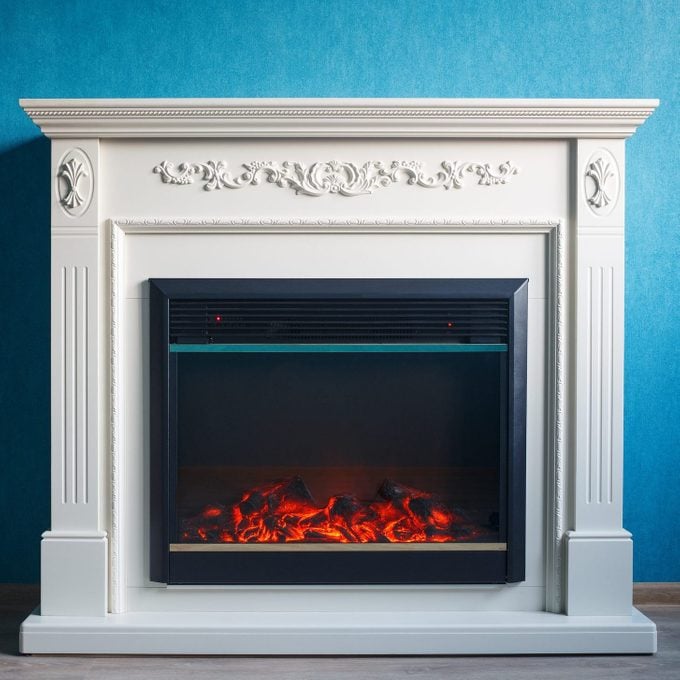Small Electric Fireplace For Bedroom
Every editorial product is independently selected, though we may be compensated or receive an affiliate commission if you buy something through our links. Ratings and prices are accurate and items are in stock as of time of publication.
Choosing between gas and electric fireplaces can be tricky. We'll run down their pros and cons to help you decide which is better for your home.
Humans respond to fire on a primal level. Maybe it's a throwback to when our ancestors huddled together, holding back the darkness with crackling flames. Or maybe we just love the cozy warmth of a fire in our homes.
Either way, it's no surprise that many homeowners opt to install a fireplace. And in recent years, the increased efficiency and lower price has made fireplace installations a popular addition to American living spaces.
While it's possible to add a new wood-burning fireplace to an existing home, the more affordable options are usually gas or electric. Gas fireplaces generate heat with natural flame, while electric fireplaces engage a heating element (much like a space heater) while creating the illusion of flames with flickering lights or video.
Gas Fireplaces vs. Electric Fireplaces: Installation
Gas fireplaces generally cost more to purchase and to install than their electric counterparts. If you don't have a natural gas line, you'll need to add one (which may not be an option where you live) or hook up a propane supply. Electric fireplaces require standard electrical outlets, but you may need to run a new line or, for larger units, a dedicated circuit. Whether it takes a 110- or 220-volt outlet depends on the fireplace.
Gas fireplaces also have more requirements on their placement inside the home. Vented gas fireplaces must allow for outside exhaust, usually against an exterior wall or inserted into an existing masonry fireplace. Ventless gas fireplaces aren't legal in all states, so check your local codes before purchasing. Electric fireplaces don't need to be vented because they don't produce carbon monoxide.
It's possible to install a gas fireplace on your own, although you'll need to hire a plumber to run the gas line. We can't say this strongly enough: Please leave that task to a pro. If something goes wrong, the fallout can be catastrophic and deadly.
DIY electric fireplace installation depends on the size and style. A permanent in-wall unit will likely require framing and drywall work, but installation for a standalone electric fireplace couldn't be any easier. Just plug it in and you're done!
Gas Fireplaces vs. Electric Fireplaces: Operating Costs
Both gas and electric models have relatively low operating costs. Which one will be more affordable depends on your local utility prices.
Check your current bill for the exact numbers for your area, but the national average cost of electricity is about 13 cents per kilowatt-hour (kWh), while the national average cost of natural gas is $1.22 per therm (or 100,000 Btu).
This means that a 1.5 kilowatt electric fireplace generating about 5,000 Btu will cost 19.5 cents per hour to operate. By comparison, a 25,000 Btu gas fireplace will cost 30.5 cents per hour to run on natural gas. With propane, the operational cost will be between two and three times that amount.
We should note that's not quite an apples-to-apples comparison. The hypothetical gas fireplace puts out about three times as much warmth as the electric model. The efficiency of a given model can also impact those numbers. Electric and unvented gas fireplaces, for instance, don't lose heat by sending hot air outside.
Gas Fireplaces vs. Electric Fireplaces: Maintenance
Modern gas or electric fireplaces need little maintenance. You may want to clean the glass front from time to time with a cleaner suggested by the manufacturer, especially on electric models with LCD screens. With a vented gas fireplace, clean the flue once a year or so.
Gas Fireplaces vs. Electric Fireplaces: Safety
Both types of fireplaces produce heat, and should be viewed as potential fire hazards. But it only takes a little caution to make your fireplace safe and secure.
Be sure that your fireplace is properly installed, and use common sense. Don't store flammable items next to the fireplace, and watch children and pets to make sure they don't stray too close. Gas fireplaces in particular can be hot to the touch.
Gas fireplaces also produce carbon monoxide (CO). Ventless fireplaces burn especially clean, allowing them to be vented indoors. If your fireplace vents through a first-floor wall, make sure you don't store items outside that obstruct the airflow around the vent.
And, of course, be sure to have a CO detector in your home. If you have a gas line and don't already have a CO detector, you need to get one ASAP!
 maksime/Getty Images
maksime/Getty Images
Finding the Best Choice for You
Gas and electric fireplaces are great choices for adding a little cozy warmth to your home. But when it comes time to pick one or the other, here are some factors to consider:
Choose a gas fireplace if you:
- Love the look of natural flame;
- Have high electrical costs;
- Already have a gas line;
- Hope to heat a larger space;
- Aren't concerned about pets or kids running into the fireplace front.
Choose an electric fireplace if you:
- Do not have a gas line;
- Don't care about having a natural flame;
- Like it cozy, but aren't interested in heating a large space;
- Don't have high electrical costs;
- Want to keep purchase price as low as possible;
- Worry about pets or kids running into the fireplace front;
- Would like a fully DIY install option;
- Want the safest possible option.
Small Electric Fireplace For Bedroom
Source: https://www.familyhandyman.com/article/gas-vs-electric-fireplace-best-for-homes/



0 Komentar